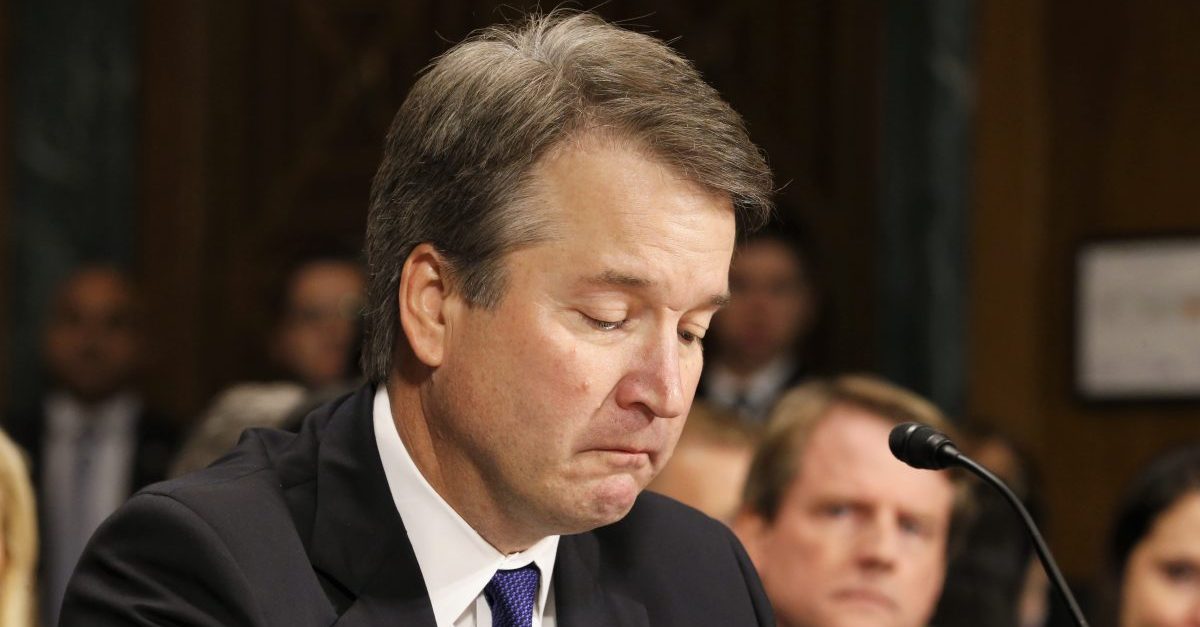
U.S. Supreme Court Justice Brett Kavanaugh was recently called out for cherry-picking a quote from a law review article that actually contradicted his argument in a case about Wisconsin’s mail-in ballot deadlines.
The conservative justice was summarily dragged through the mud and the muck by legal commentators on social media basically all day on Tuesday over the perceived bout of dishonesty. Election law expert Rick Hasen savaged Kavanaugh in an op-ed for the Washington Post:
Kavanaugh suggested without evidence that there would be a problem if voting results were not final on election night and results of the election could “flip” to another candidate, even though vote totals are never final on election night and require weeks to count. As a veteran of Bush v. Gore, Kavanaugh surely knows this; he may have even been involved in efforts in the weeks after the vote took place in Florida in 2000 to make sure that late-arriving military and overseas absentee ballots would be included in the state’s vote totals. The statement about vote totals this fall was unnecessary to his legal argument, and it served only to echo Trump’s false talking points about mail-in ballots.
Despite the outcry and avalanche of criticism, North Carolina’s Republican Senate Leader Phil Berger promptly and approvingly cited Kavanaugh’s concurrence as a harbinger of “chaos” that might occur after voting ends on Election Day.
“Kavanaugh succinctly captured the essence of the problem with unelected [sic] state panels or judges changing laws passed by a state legislature to govern an election,” Berger argued in a press release featuring an argument that may be repeated by GOP leaders (and lawyers) hewing to the party line on mail-in ballot deadlines in the final days of the 2020 general election–and perhaps beyond.
The Tar Heel State Republican cited the the portion of Kavanaugh’s highly-criticized concurrence that quoted the aforementioned law review article [emphasis in original]:
For important reasons, most States, including Wisconsin, require absentee ballots to be received by election day, not just mailed by election day. Those States want to avoid the chaos and suspicions of impropriety that can ensue if thousands of absentee ballots flow in after election day and potentially flip the results of an election…The States are aware of the risks described by Professor Pildes: “[L]ate-arriving ballots open up one of the greatest risks of what might, in our era of hyperpolarized political parties and existential politics, destabilize the election result. If the apparent winner the morning after the election ends up losing due to late-arriving ballots, charges of a rigged election could explode.”
As Law&Crime previously reported, however, New York University Law Professor Richard Pildes actually made the precise opposite point that Kavanaugh suggested Pildes’s law review article supported.
Here’s the article’s conclusion which Kavanaugh declined to provide:
States that require absentees to be received by election night or shortly after should move this date back. Moreover, if a significant number of votes come in after a receipt deadline that has not been changed and that is much tighter than in other states, ex post litigation challenging that deadline is easy to imagine. This is exactly what we do not want to face for a risk that can be mitigated in advance.
Berger’s press release did not dive into the minutiae of the law professor’s argument, but did stake alleged fears of post-Election Day chaos on an argument that Pildes decidedly did not make–essentially weaponizing the original mischaracterization in a way, critics pointed out, that feeds into an already extant cycle of fears regarding mail-in voting that have been promoted relentlessly by the Republican Party this election season.
“The laws enacted by North Carolina’s legislature are actually looser than Wisconsin’s,” the Berger press release said. “In North Carolina, ballots mailed by Election Day and received up to three days later are counted. Bipartisan supermajorities in the legislature decided on the law governing this election months before balloting began. Yet unelected [sic] bureaucrats on a state panel controlled by one political party decided to violate state law and extend the ballot receipt deadline to nine days after the election.”
Legal commentators quickly called out the North Carolina GOP leader for, essentially, dishonestly quoting an already dishonest quote:
Legal journalist and attorney Mike Sacks pointed out an operative piece of irony regarding the North Carolina GOP on this point–an issue also touched upon by Slate’s Mark Joseph Stern; there is currently a case pending before the Supreme Court (brought by the Republican Party) that aims to overturn the nine-day ballot return deadline instituted by the North Carolina State Board of Elections to account for the ongoing novel coronavirus (COVID-19) pandemic.
In fact, as Sacks noted, Berger himself petitioned the nation’s high court in order to maintain that three-day ballot return deadline–which is the exact number of days in the deadline that Kavanaugh and his conservative colleagues on the high court just voted to overturn in Wisconsin.
[image via Michael Reynolds-Pool/Getty Images]